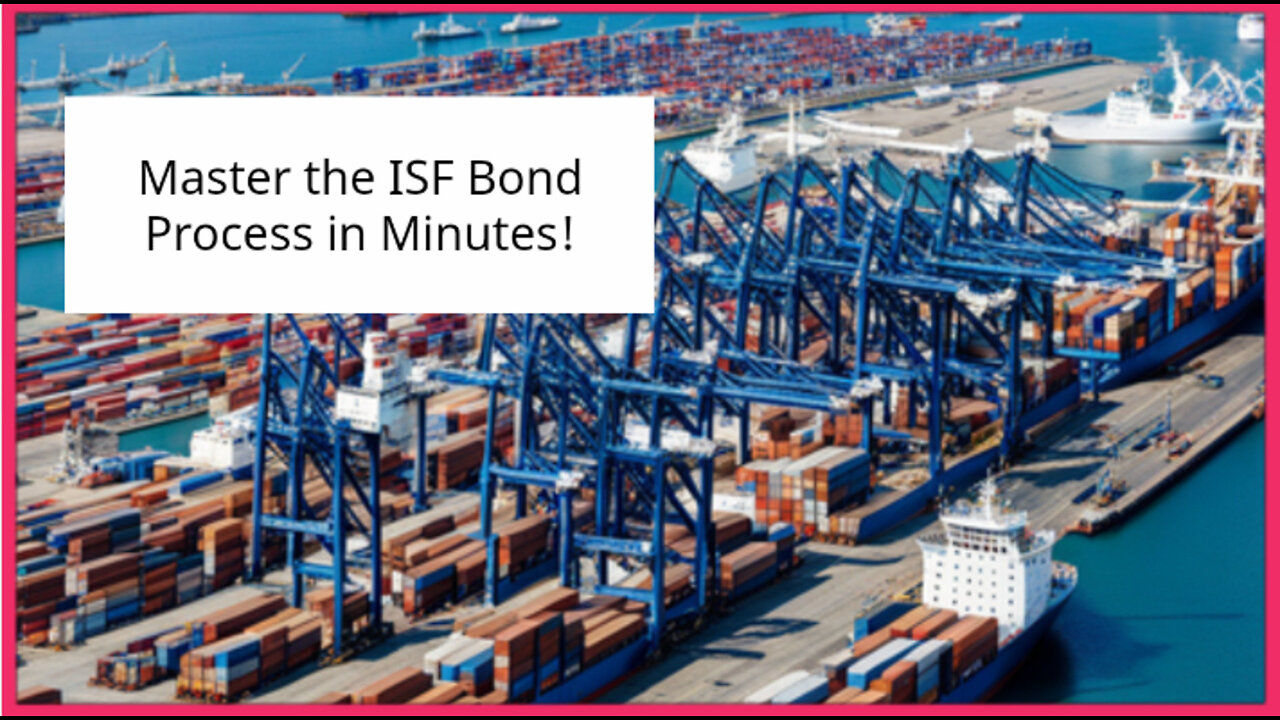Premium Only Content

Demystifying the ISF Bond Process: Your Key to Efficient Importing
ISF Filer || [email protected] || 858-280-9374 || www.isffiler.com
In today's video, we discussed the ISF bond process and its importance in customs brokerage. The ISF bond is a financial guarantee that ensures the importer will comply with the filing requirements and pay any penalties. It is an essential requirement for importers when bringing goods into the United States by ocean freight. The ISF bond is a continuous bond that remains active for one year and covers multiple shipments during that period. It is important to renew the bond annually to ensure uninterrupted import operations.
Having an ISF bond in place offers several benefits to importers. Firstly, it allows them to comply with CBP requirements and avoid penalties or delays in the clearance process. It also helps build a positive relationship with CBP, demonstrating the importer's commitment to supply chain security. Additionally, the bond provides financial protection to the surety company, minimizing their risk.
The process of obtaining an ISF bond involves working with a licensed customs broker who will assess the importer's needs, gather the necessary information, and present it to the surety company for evaluation. The surety company will underwrite the bond, considering factors such as the importer's financial strength, trade activity, and compliance history. Once issued, the importer and customs broker receive a copy for their records.
The cost of an ISF bond varies based on the importer's risk profile and the required bond amount. It is important for importers to maintain accurate and timely ISF filings to avoid penalties. Failure to file or submitting inaccurate information can result in fines from CBP, negatively impacting the importer's reputation and supply chain operations.
In conclusion, the ISF bond process is a significant aspect of customs brokerage and international trade. It ensures compliance with CBP requirements, provides financial protection, and allows importers to navigate the trade landscape smoothly. Stay tuned for more engaging content on customs brokerage and international trade.
#usimportbond #isfcustomsbroker #uscustomsclearing #isfentry
Video Disclaimer Here: This video is intended for educational purposes and has no affiliation with US government entities.
00:30 The ISF bond process is a crucial part of the Importer Security Filing program, required by U.S. Customs and Border Protection to enhance supply chain security.
00:48 - Importers must file an ISF, also known as the 10+2 filing, at least 24 hours before cargo is loaded onto a vessel departing from a foreign port when importing goods via ocean freight.
01:05 - The ISF bond is a continuous bond lasting one year, providing financial protection to CBP in case of non-compliance with ISF requirements or penalties. It is essential to renew annually for uninterrupted import operations.
02:29 - Obtaining an ISF bond involves working with a licensed customs broker to secure it from a surety company, considering factors like the importer's financial stability and customs compliance history. Maintaining accurate and timely ISF filings is crucial to avoid penalties and ensure smooth international trade operations.
-
 3:30:07
3:30:07
Barry Cunningham
6 hours agoBREAKING NEWS: COUNTDOWN TO COMMUNISM! ELECTION RESULTS SHOW!
39.4K36 -
 2:11:28
2:11:28
DeVory Darkins
5 hours agoLIVE NOW: 2025 Election results and Exit Polls AMA
48.5K41 -
 DVR
DVR
DLDAfterDark
4 hours ago $0.03 earnedJust Another Tuesday - In Virginia - The Governor's Race & Glock Talk
21.6K1 -
 3:21:38
3:21:38
The Charlie Kirk Show
7 hours agoJUDGMENT DAY 2025: The Election Results Stream
175K77 -
 3:51:07
3:51:07
MattMorseTV
8 hours ago $0.77 earned🔴Election Day LIVE COVERAGE.🔴
85.6K47 -
 1:16:51
1:16:51
Flyover Conservatives
1 day agoSHOCKING DATA REVEALS: Young Voters Are Done With the Old GOP - Mark Mitchell, Rasmussen Reports | FOC Show
32.7K16 -
 1:15:28
1:15:28
Sarah Westall
7 hours agoGrooming is Protected and Encouraged by the System – Michelle Peterson and Mike Adamovich
32K10 -
 4:00:13
4:00:13
Akademiks
5 hours agoKendrick tries to Flip the Bots on DRAKE? WHo Beats Jay z in a verzuz. Blueface finally free!
33.5K7 -
 1:38:16
1:38:16
Professor Nez
10 hours ago🚨ELECTION NIGHT 2025 LIVE! Massive Upsets Brewing in New York, New Jersey & Virginia!
31.3K10 -
 4:48:50
4:48:50
Due Dissidence
13 hours agoLIVE: ELECTION RESULTS From NYC, NJ, and VA - Trump Approval CRATERS, Kash's Private Jet CRASH OUT
50.4K22